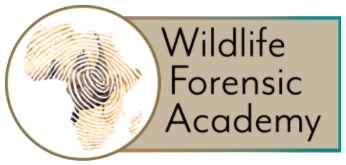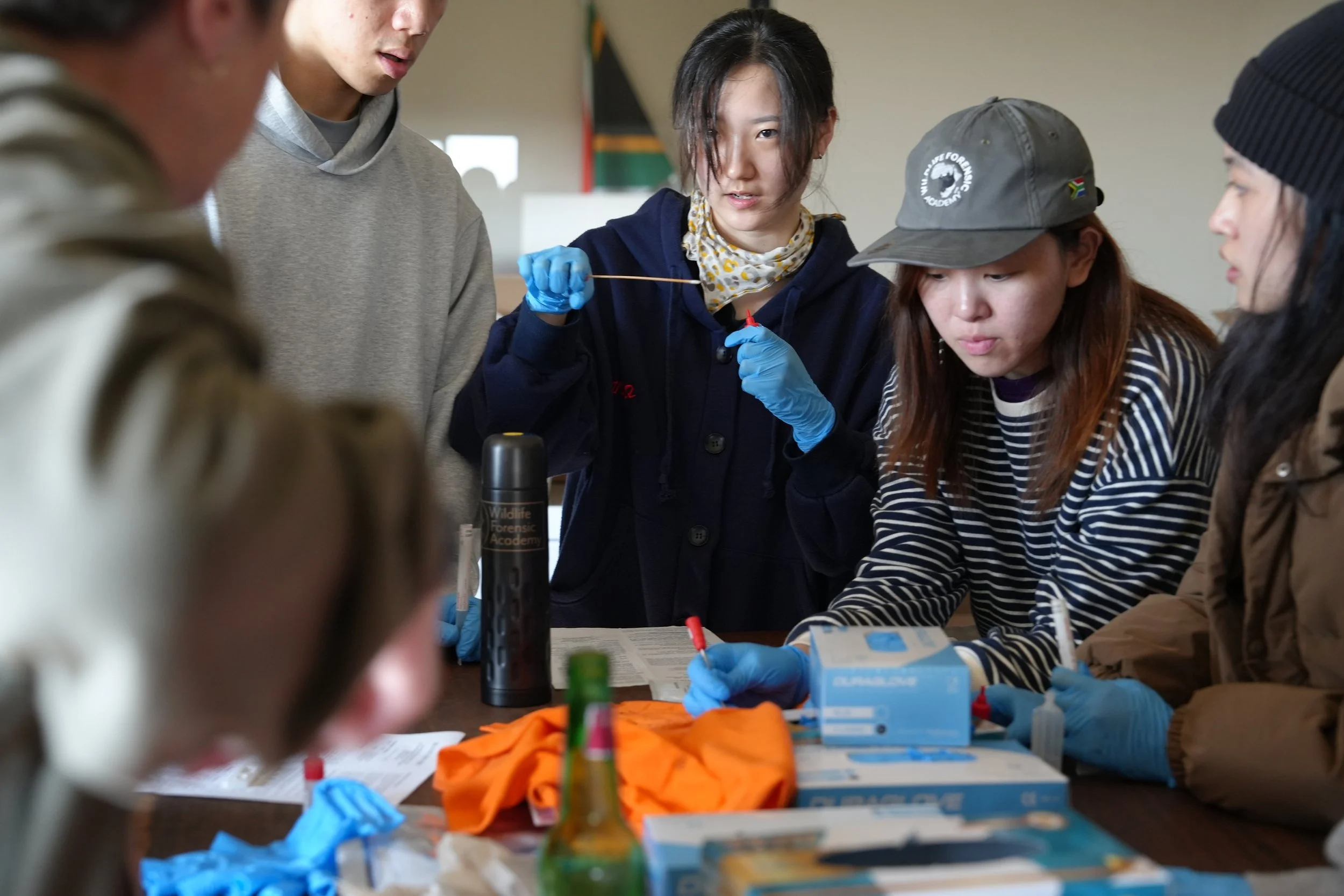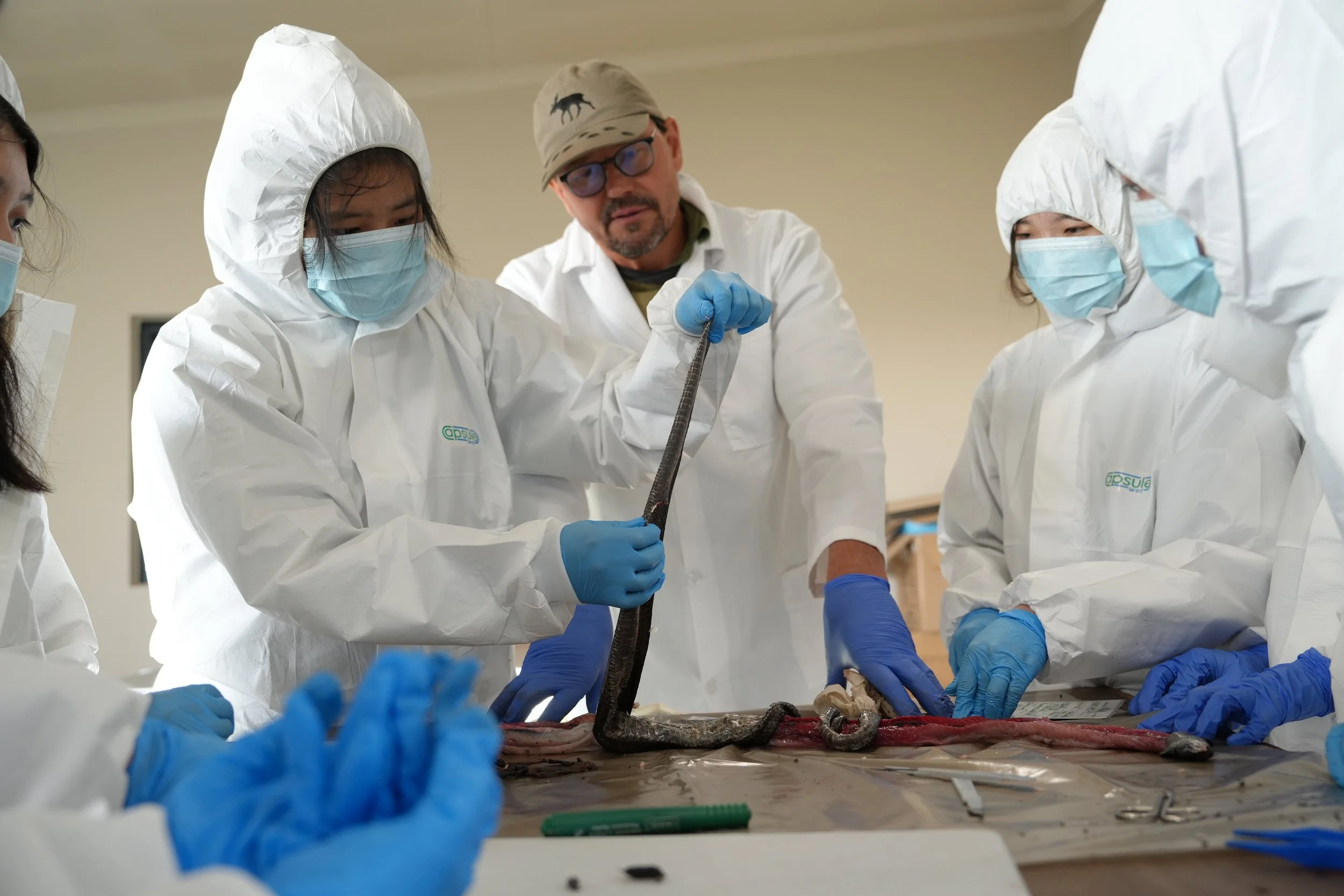
2-WEEK COURSE: WILDLIFE FORENSICS,
CRIME SCENE MANAGEMENT AND ILLEGAL WILDLIFE TRADE
This immersive two-week program is ideal for individuals seeking a comprehensive introduction to wildlife forensics and conservation, enriched by multiple excursions to experience the cultural richness of South Africa. The course, through combining hands-on learning with elements of educational tourism, offers a unique opportunity to explore the diverse ecology of the Greater Cape Town area while developing practical skills in wildlife crime investigation and ancillary fields.
Participants will gain in-depth knowledge in wildlife crime and the illegal wildlife trade, expand their professional toolkit, and experience the beauty and complexity of wildlife conservation in Africa - making for a truly unforgettable and transformative learning journey.
This course has been approved by the Charted Society of Forensic Sciences and is eligible for or continuous professional develop credits: 72.5 CPD
For University students, this course may be eligible to be used for university course credits - please check with your university. A summary on contact hours and learning objectives can be requested - please contact us directly to arrange.
Objectives:
In-depth understanding of Wildlife Forensics, Wildlife Crime and illegal wildlife trade;
Gain confidence in conducting a Wildlife Crime Investigation with forensic skills in trace collection, documentation and presentation of evidence in a courtroom;
Unique learning experience in Africa. Witness the diversity of South African wildlife and be exposed to the issues and role-players in this field.
This course is for you if:
You are a professionals working in wildlife conservation, wildlife protection, forensic science, criminology, law enforcement, and crime scene investigation
You are an individual in adjacent fields seeking to broaden your understanding of wildlife forensics and related disciplines
Are an undergraduate and postgraduate university student pursuing studies in forensic science, criminology, biology, conservation or related areas
We welcome participants from diverse professional and academic backgrounds who share a passion for applying science in the pursuit of justice
Program:
This training includes the following:
Introduction to Wildlife Crime, Poaching and Illegal Trade;
Marine Wildlife Poaching;
Preservation of a Crime Scene;
Role of Forensics;
Forensic Traces (Detection and Collection);
Crime Scene Management;
Forensic Photography;
Wildlife Anatomy: Handling and First Aid;
Forensic Veterinary Pathology;
Human-Wildlife Conflict;
Hands-on Experience Laboratory Training:
Human Behaviour at the Crime Scene;
Courtroom Training;
Anti-poaching and Bush Skills;
Injured and Poisoned Animal Management;
Health: Wildlife and Human: Risks and Prevention;
South African Fauna and Flora;
Wildlife tracking and basic survival skills.
Educational Touristic Activities:
San Cultural Experience;
Marine Conservation and Research;
Tour of Cape Point and Table Mountain;
Cape Town Waterfront;
Two Oceans Aquarium Educational Tour;
Seabird Conservation and Rehabilitation Tour;
Cheetah Outreach Educational Tour;
Game Drive;
There will also be a morning with surfing/sea kayaking/whale watching - weather permitting.
What You Will Learn:
You will be introduced to a broad spectrum of wildlife crime cases and the investigative methods used to address them. Building on your existing knowledge of forensic science and investigative techniques, you will apply these skills to a variety of wildlife crime scenarios, with particular emphasis on the challenges and crime types prevalent in South Africa. By exploring the core principles of forensic science, you will develop an understanding of how continuity and integrity of evidence, crime scene documentation, and the recovery and analysis of evidence are crucial to effective wildlife crime investigations.
Hands-on experience will be gained through practical sessions at the state-of-the-art crime scene facility located at Buffelsfontein Nature Reserve just an hour outside of Cape Town, South Africa. These mock crime scenes will allow you to plan, document, and execute investigations that mirror real-world conditions. You will also be introduced to related disciplines that play a critical role in wildlife crime investigations, including forensic veterinary pathology and the management of injured or compromised animals.
To contextualise these skills within the broader global crisis, the program will also introduce you to the illegal wildlife trade—one of the primary drivers of wildlife crime. You will learn how this multi-billion-dollar transnational enterprise fuels poaching, trafficking, and biodiversity loss, and identify how forensic science can contribute to dismantling these criminal networks.
In addition to the theoretical and practical training, participants will take part in a range of educational visits and cultural activities. These experiences will deepen your understanding of South Africa’s conservation landscape and expose you to the organisations and initiatives actively working to protect wildlife, while also enriching your appreciation of the country's diverse cultural heritage.
How You Will Learn:
A mix of lectures, demonstrations, flipped classroom and hands-on practical activities will be utilised. In addition, education excursions will be integrated into programme to provide background context to South African wildlife, conservation and culture.
Lectures
Theory, knowledge, understanding
Experimental Learning
Practice, problem solving, application
Educational Excursions
Context, background, culture
Educational Aims:
To introduce and expand knowledge and practical skills in wildlife crime investigations with particular focus on South African flora and fauna including current conservation challenges and legislation.
To apply current forensic and policing knowledge and skills to wildlife crime investigations including the criminal justice chain and recovery, analysis and interpretation of evidence.
Learning Outcomes:
Explain what wildlife crime is and what challenges exist in the investigation of wildlife crime on a national and global-scale.
Identify the interaction between the illegal wildlife trade and wildlife crime.
Describe current initiatives that exist to combat wildlife crime as introduced in the course.
Demonstrate the correct techniques and skills to investigate a wildlife crime scene as applied to a mock case, inclusive of:
Identifying various types of crime scene
Approaching the crime scene
Assessing the deceased/living animal(s)
Awareness of health and safety (personal protection)
Crime scene management (securing, documenting, handling, and collecting evidence)
Identify the main forensic science techniques used to analyse commonly encountered evidence on wildlife crime scenes.
Present the findings of a mock wildlife crime scene investigation via submitting a formal, legal written statement and testifying on the statement within a mock court
Reflect on your own understanding of conservation challenges as related to wildlife crime, including human-wildlife conflicts.
Evaluate the impact that these challenges have on the investigation of wildlife crimes
Work independently and within a group to complete course activities.
Location:
The training will be facilitated at Buffelsfontein Game and Nature Reserve on the West Coast of South Africa as well as in Cape Town.
What’s Included:
Catering (Breakfast, Lunch and Dinner);
Transport during the course;
Airport Pick-up and Drop off;
All entry and tour fees.
Not Included:
Alcoholic drinks;
Flights to and from Cape Town;
Our shuttle service will collect course participants from Cape Town between 8:00 AM and 9:00 AM on the Sunday the course begins. The course will conclude on Saturday afternoon, with participants being dropped off at their accommodation or the airport. Upon request, we can provide recommendations for reputable drivers for airport transfers and suggested Cape Town accommodations.
Course Dates:
1 February 2026: PARTIALLY BOOKED
12 April 2026: PARTIALLY BOOKED
3 May 2026: FULLY BOOKED
14 June 2026: FULLY BOOKED
12 July 2026: FULLY BOOKED
30 August 2026: LIMITED AVAILABILITY
*Tailored 10-Day Course [Group bookings may request tailored course - please take a look at course tailoring options and enquire]
Disclaimer: Courses may include a mix of students and professionals from various organisations and fields, depending on enrolment numbers. If an institution or organisation wishes to reserve an entire two-week course exclusively for their group, please contact us at admin@wildlifeforensicacademy.com to find out further details and options.
Cost:
$3375 | €2900 | £2495
*CSFS members receive a 5% discount on the approved 1-week and 2-week courses in 2026
Payment options:
You have two payment options:
1. Pay in full – You can choose to pay the entire course fee upfront.
2. Pay a deposit – Alternatively, you can secure your spot with a deposit of $500/€500/£440. The remaining balance can then be paid either in one lump sum or in 2–4 instalments.
Please read our FAQ section for more payment related details.
Got Questions?
Start by browsing our FAQ section - you might find your answer there. If not, feel free to fill out our contact form, and we’ll get back to you as soon as possible.
Organizations and universities that have trained with us:

Hogeschool van Amsterdam (HvA)

Homeland Security (HSI)

American University of Ras Al Khaimah (AURAK)

National Taiwan University

University of Central Lancashire (UCLAN)
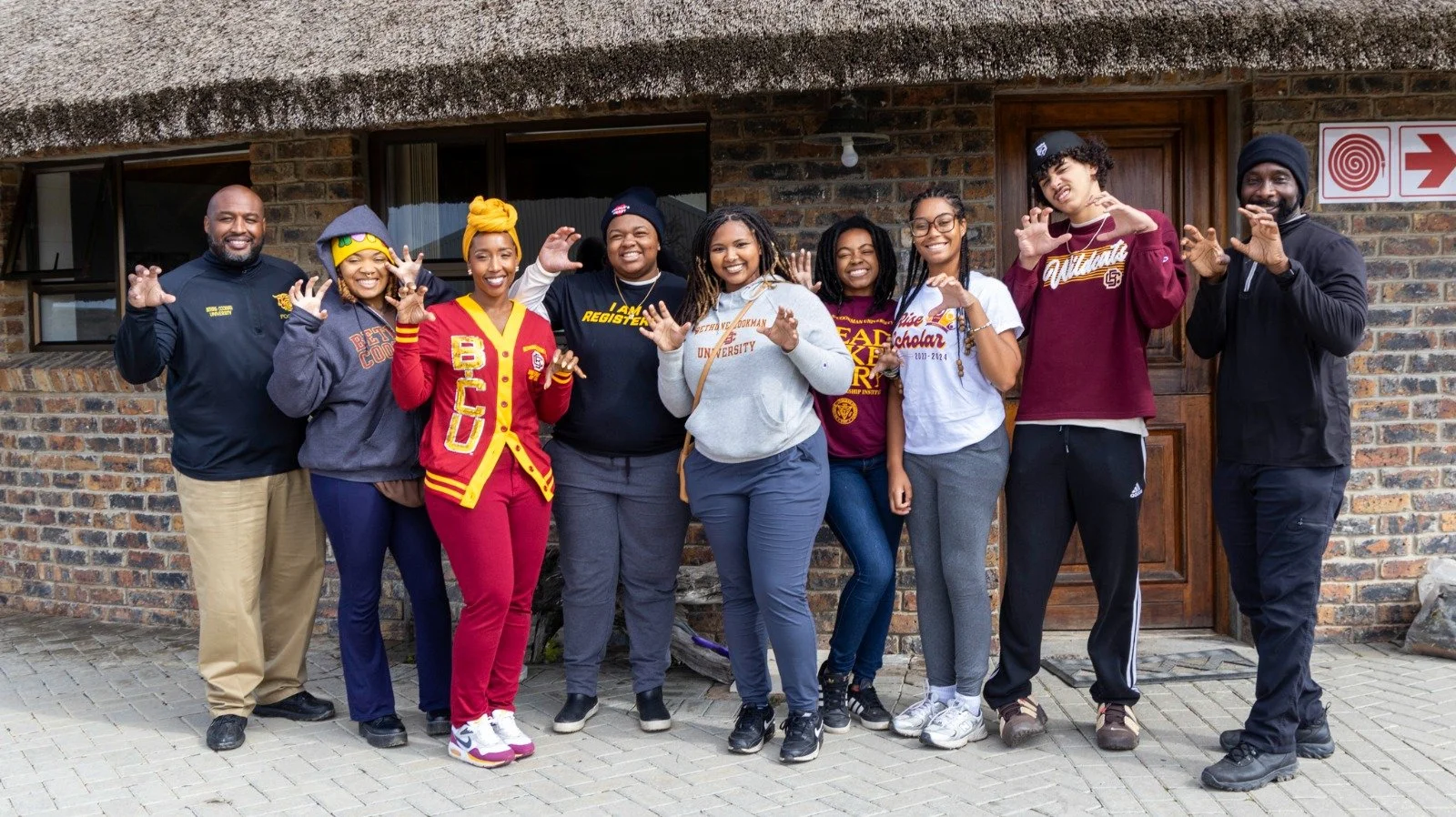
Bethune Cookman University

Saxion University
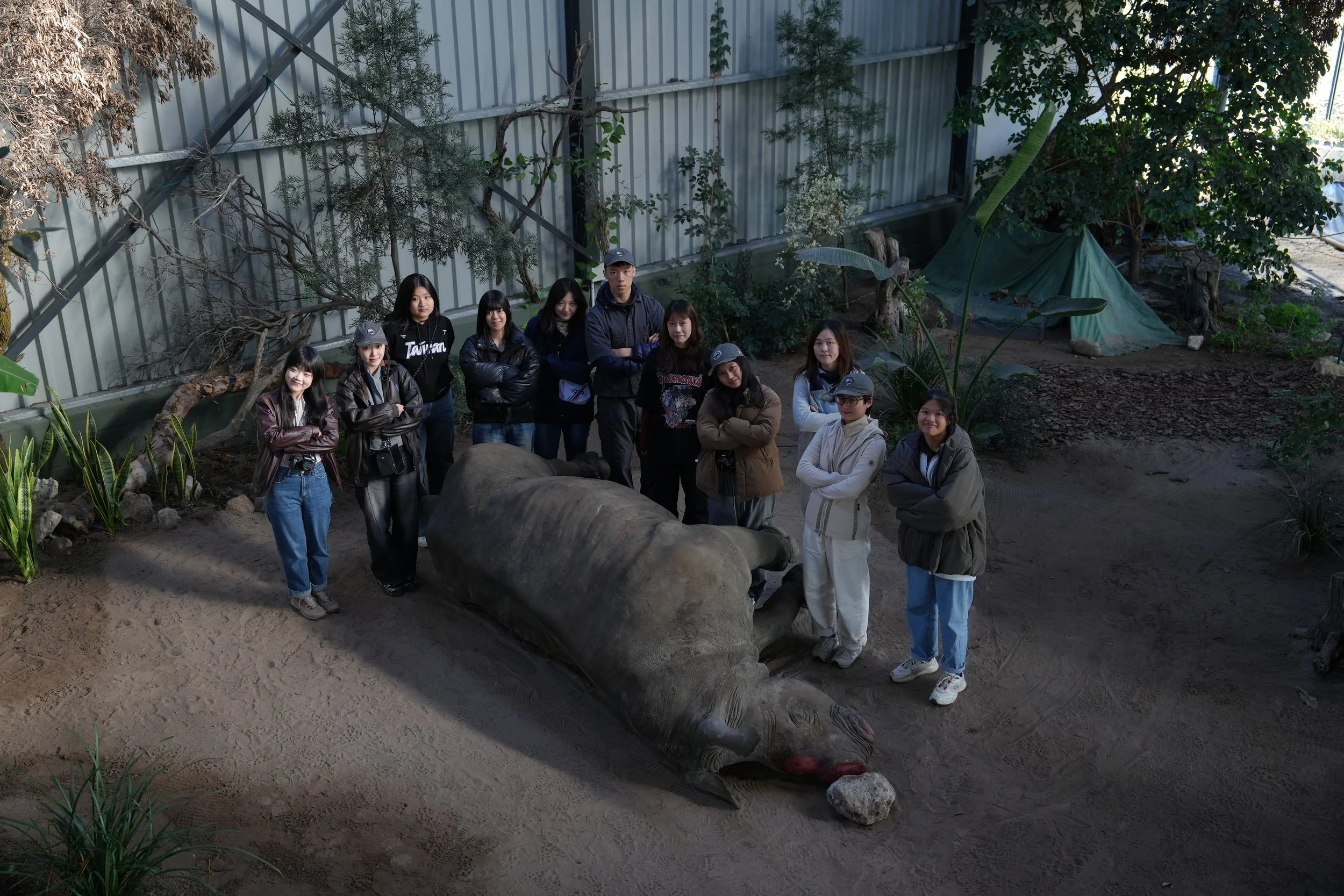
National Taiwan University (NTU)
Testimonials:
“I gained a lot of experience in the course as well as more about wildlife crime which isn’t talked about enough, helped build my understanding of other sectors of forensic science and the opportunities it could lead to. Through this course so far I’ve been able to deepen my knowledge in the other side of forensics which this insight and experience which help me to apply to not only furthering my degree but future work and career. This will be unforgettable.”
— Student, University of Kent (UK)
“I underestimated the importance of Wildlife crime and have come away with much more of an open mind. Would do it all over in a heartbeat, absolutely loved the experience and learnt so much and also made friends for life on this trip, staff and lecturers for the course were so informative and knowledgeable, could listen to them for hours! I can’t wait to apply all my knowledge I have learnt from this trip into my future.”
— Student, University of Central Lancashire (UK)
“Amazing and an unforgettable experience. Would recommend this course for all students in this field or enthusiastic about animals. Each module taught was planned and implemented perfectly. Everyone must try at least once in their lives.”
— Student, American University of Ras Al Khaimah (UAE)
